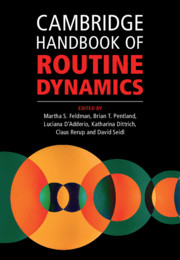Book contents
- Cambridge Handbook of Routine Dynamics
- Cambridge Handbook of Routine Dynamics
- Copyright page
- Contents
- Figures
- Tables
- Contributors
- Preface
- Chapter 1 What Is Routine Dynamics?
- Part I Theoretical Resources for Routine Dynamics Research
- Part II Methodological Issues in Routine Dynamics Research
- Chapter 8 Ethnography and Routine Dynamics
- Chapter 9 Video Methods and Routine Dynamics
- Chapter 10 Field Experiments and Routine Dynamics
- Chapter 11 Agent-Based Modelling in Routine Dynamics
- Chapter 12 Sequence Analysis in Routine Dynamics
- Chapter 13 Narrative Networks in Routine Dynamics
- Chapter 14 Bakhtin’s Chronotope and Routine Dynamics
- Part III Themes in Routine Dynamics Research
- Part IV Related Communities of Thought
- Author Index
- Subject Index
- References
Chapter 10 - Field Experiments and Routine Dynamics
from Part II - Methodological Issues in Routine Dynamics Research
Published online by Cambridge University Press: 11 December 2021
- Cambridge Handbook of Routine Dynamics
- Cambridge Handbook of Routine Dynamics
- Copyright page
- Contents
- Figures
- Tables
- Contributors
- Preface
- Chapter 1 What Is Routine Dynamics?
- Part I Theoretical Resources for Routine Dynamics Research
- Part II Methodological Issues in Routine Dynamics Research
- Chapter 8 Ethnography and Routine Dynamics
- Chapter 9 Video Methods and Routine Dynamics
- Chapter 10 Field Experiments and Routine Dynamics
- Chapter 11 Agent-Based Modelling in Routine Dynamics
- Chapter 12 Sequence Analysis in Routine Dynamics
- Chapter 13 Narrative Networks in Routine Dynamics
- Chapter 14 Bakhtin’s Chronotope and Routine Dynamics
- Part III Themes in Routine Dynamics Research
- Part IV Related Communities of Thought
- Author Index
- Subject Index
- References
Summary
Experimental approaches are gaining in popularity across disciplines, ranging from behavioural sciences to economics. In this chapter, we discuss the advantages and disadvantages of field experiments and review their use by scholars to study routine dynamics. Based on these, we suggest that field experiments hold further promise to study routines given their potential to develop and test theory, while achieving internal and external validity. To further the adoption of field experiments to study routines, we outline a five-step procedure, including research questions and hypotheses, context and research setting, treatment and design, measurement and statistical tests, and managing field experiments. We conclude by discussing potential research questions and contexts suitable for field experiments.
Keywords
- Type
- Chapter
- Information
- Cambridge Handbook of Routine Dynamics , pp. 147 - 158Publisher: Cambridge University PressPrint publication year: 2021

